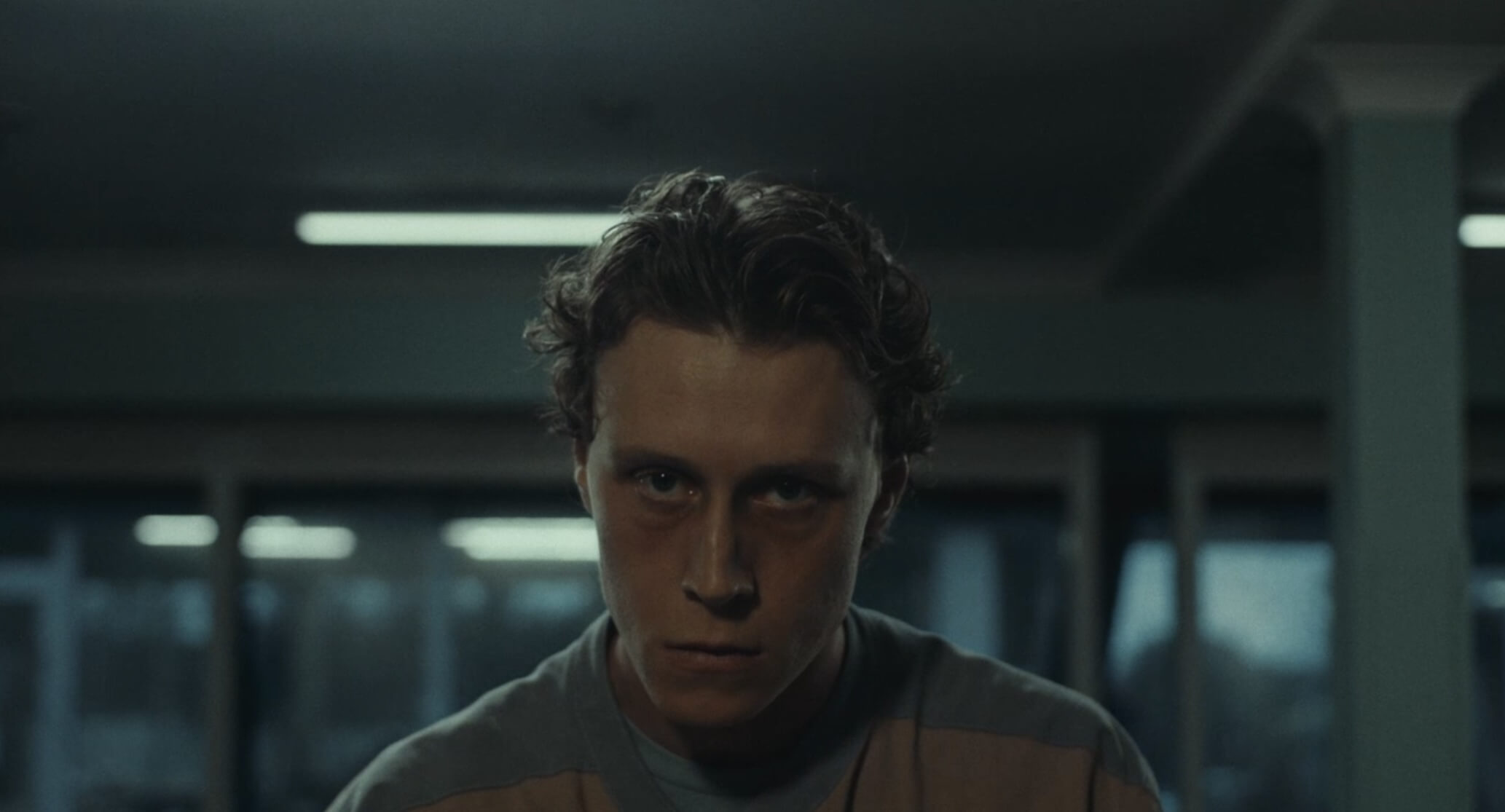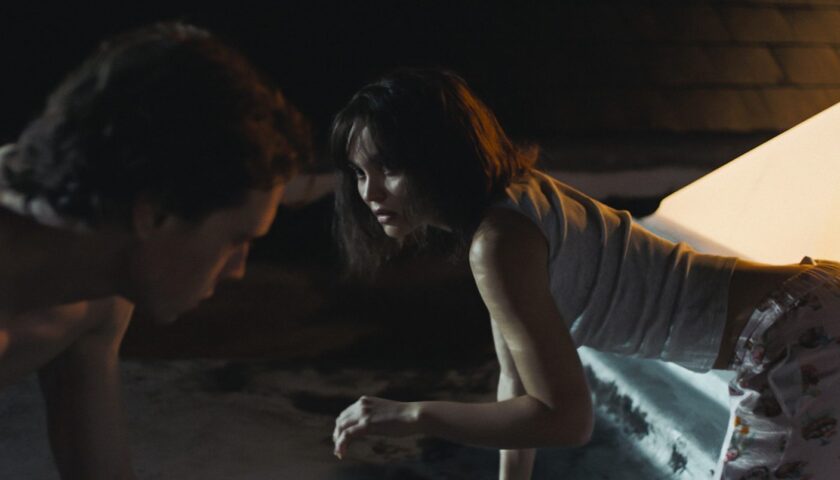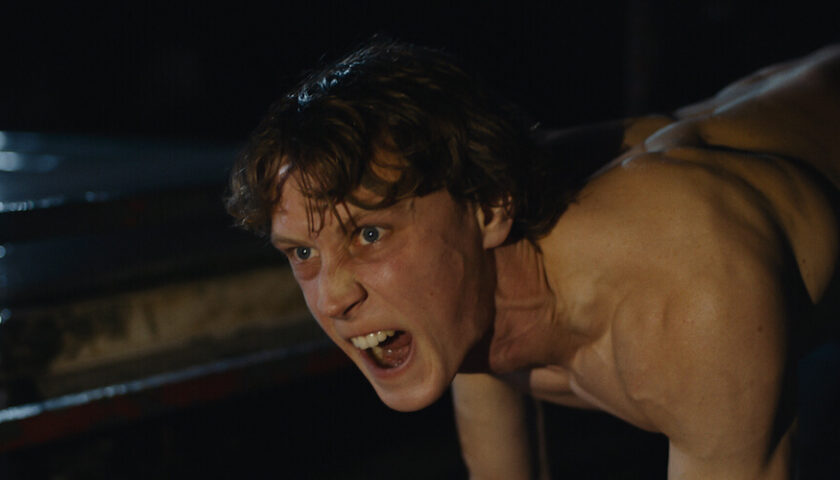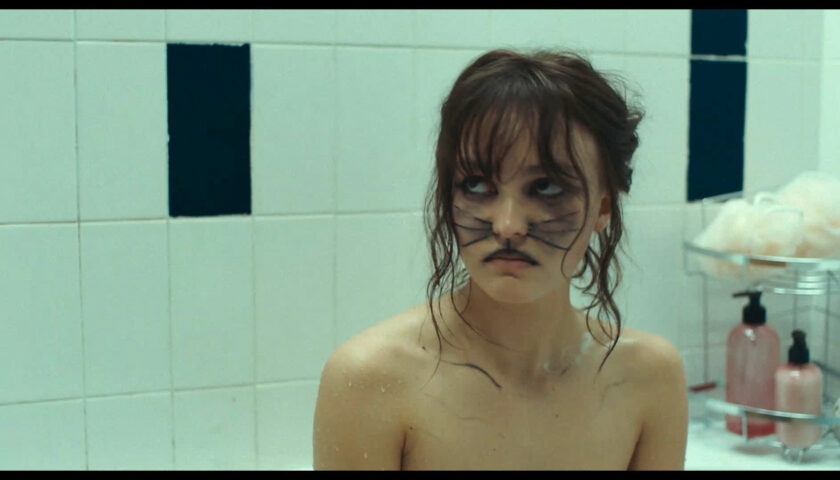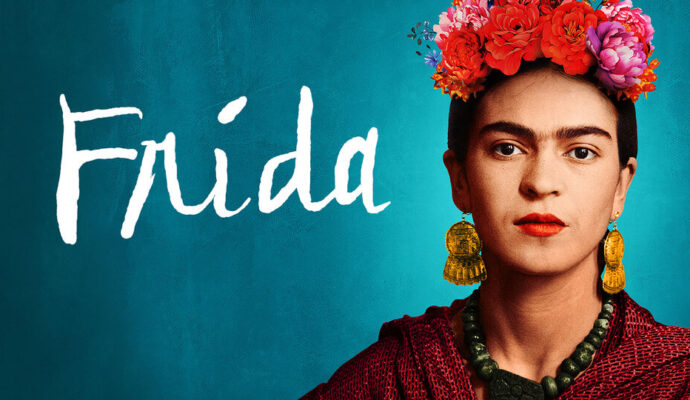“Wolf” (2021) – “A man might befriend a wolf, even break a wolf, but no man can truly tame a wolf.” – George R. R. Martin
Jacob (George MacKay) has a problem. His troubles are his family’s problem too, and his mom and dad turn over their hopes to a quasi-mental institution for help in writer/director Nathalie Biancheri’s disturbing drama, “Wolf”.
You see, Jacob – a physically fit 20-something – believes that he’s a wolf. Now, his eyesight seems satisfactory, and he lives in a world with mirrors, so he realizes that he doesn’t appear as a wild, four-legged canine. This six-foot young man thinks he’s a wolf trapped in a human’s body, and Biancheri did not conjure up this concept, as she mentions during a Sept. 17, 2021 TIFF interview.
“I heard about this real-life phenomenon called species dysphoria, and I thought it was super-interesting. I started researching it, and I found that it was just something I knew nothing about, where people actually believe that they’re an animal trapped in a human’s body, Biancheri says.
She adds, “I used this conceptual idea of a person who believes that they’re an animal as a jumping-off point to then enter much more fictional territory.”
“Wolf” is dystopian, and in fact, Biancheri’s picture has a “The Lobster” – Yorgos Lanthimos’ sensational and bizarre 2015 dramedy – vibe. Sure, both movies were filmed in Ireland, but they each feature a society institutionalizing a number of human beings to fit within its norms. Granted, the 2015 oddball flick’s premise – and chock-full of dry humor – is that single adults will live out the rest of their lives as animals of their choosing unless they find spouses or partners within 45 days. The consequences reek with severity, but Lanthimos stirs comic absurdity with unexpected violence in his film to alienate or involve its audience.
It all depends upon the viewer.
Not so with “Wolf”. This is a very different movie, as dread and unrest accompany the script and on-screen events.
After Jacob’s folks drop him off at the hospital, and he dons blue and cream-colored attire (matching his fellow patients), we soon realize our protagonist’s worrisome road. It’s not a winding one, but a straight-head, one-way freeway toward a cure, as it were. A man nicknamed “The Zookeeper” (Paddy Considine) makes all the weighty decisions, including the final judgment about his patients actually leaving the unfriendly confines.
The obvious goal is to free the patients from their animal notions.
Now, Eileen Walsh plays an amiable on-site therapist, and she welcomes a collection of young people (who individually think they are a dog, parrot, horse, squirrel, or name another member of the animal kingdom) to search their feelings or sing Laura Branigan’s “Gloria”. However, The Zookeeper finds severe methods of persuasion.
He delivers tough love in spades without any trace of empathy. Although you and I will find these on-site inmates’ core beliefs utterly fantastical, The Zookeeper’s approach towards treating species dysphoria is callous, uncaring, and sometimes ruthless.
Certainly, Biancheri plays with our patience and twists it in a bind. The teens and 20-somethings – like the Wildcat (Lily-Rose Depp), German Shepherd (Fionn O’Shea), Jacob, and many more – act out their beastly alter-egos like an assembly of elementary school kids filled with sizable helpings of Monster Energy and LSD.
It’s a madhouse.
Honestly, only patron saints or dedicated health care professionals could stomach the lunacy within these walls. The Zookeeper is neither one. Well, he’s dedicated, but his methods are bathed in disdain. His persona is a combination of Nurse Ratched (“One Flew Over the Cuckoo’s Nest” (1975)) and Gny. Sgt. Hartman (“Full Metal Jacket” (1987)), but he wraps himself in George Bailey (“It’s a Wonderful Life” (1946)) packaging.
Still, there’s zero nuance here, as we know that this immovable object faces an irresistible force in the form of Jacob/The Wolf. Sure, Jacob could have a change of heart, but the film frames his and the others’ internal wiring as permanent.
In other words, this is a hopeless, one-note exercise.
Undoubtedly, “Wolf” is a thought-provoking idea as the film explores ethics and societal acceptance, but it also moves in one constant – unpleasant and peculiar – direction. It carries and airs of doom and hopelessness without many breaks. As the troubling and expected events between master and servant play out, the main question is: will Jacob really transform into a wolf, a la “An American Werewolf In London” (1981) or “The Howling” (1981)?
Ah, I won’t say, but I will unequivocally state that MacKay is compelling as a man believing that he is a wolf. His snarling, bare-chested, crawling-on-all-fours performance is terribly unsettling, including one wince-inducing scene where Jacob courts Depp’s Wildcat in the middle of the night.
Now, the Wolf and Wildcat have another moment where they verbalize their convictions, as the screenplay finally reveals their headspaces. We could’ve used a lot more of these scenes.
Yes, these characters generally emote, but mainly in a primal manner without enough human shades to conflict with their split personalities. They effectively gush as animals, and that’s the intended approach for this celluloid trial, but “Wolf” isn’t a palatable time at the movies, at least it wasn’t for this human.
⭐⭐ out of ⭐⭐⭐⭐
Directed and written by: Nathalie Biancheri
Starring: George MacKay, Lily-Rose Depp, Paddy Considine, and Eileen Walsh
Runtime: 98 minutes
Rated: R
Image credits: Focus Features

